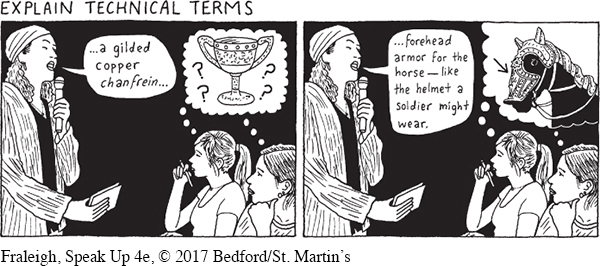The Importance of Language and Word Choice
You make thousands of word choices every day when you talk with friends and family, take notes in class, write emails, make phone calls, and send text messages. Most of us try to choose our words carefully in each of these situations. After all, our words have a lot of power: they can inform, inspire, and uplift others. But they also can confuse people (for example, if you’ve used jargon or slang that others might not understand), and they can hurt others (for instance, if you’ve used biased language).

Page 338
Your word choice defines you as a speaker. Recall that a speaker’s ethos, or personal credibility, can influence an audience’s perception of the presenter’s message. Your words and phrases convey your ethos to your listeners because they say something about you as a person.
How do you use words in ways that clarify your message and enhance your credibility? Along with using appropriate and considerate language, you can explain technical terms and use helpful presentation aids (for clarity), thus effectively incorporating such terms into your speech (to enhance credibility).
A student speaker named Gillian applied these practices while delivering an informative presentation about armor plating used during the Ottoman empire. Gillian showed photographs depicting the armor worn by soldiers and their horses. She also used technical terms in a way the audience would understand. For instance, at one point she discussed a “gilded copper chanfrein,” which she immediately explained was “forehead armor for the horse—
